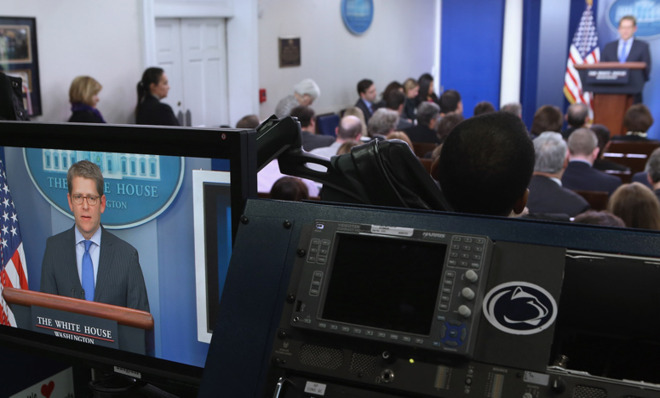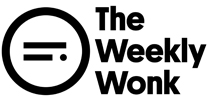Yes, Obama's White House is more secretive than Bush's
It "has become so brittle, and so controlling of the message, that people are afraid to respond to me"

A free daily email with the biggest news stories of the day – and the best features from TheWeek.com
You are now subscribed
Your newsletter sign-up was successful

Jay Carney is free. But not loose — at least so far. After resigning as the press secretary for President Obama on June 20, Carney gave insight into the Obama administration's handling of classified documents, and responded to criticism that this administration has been the most Orwellian in recent history.
"I know — because I covered them — that this was said of Clinton and Bush, and it will probably be said of the next White House," said Carney in a recent New York Times Magazine interview. "I think a little perspective is useful…It is a serious, serious matter to leak classified information. Some of the debate around this kind of forgets how serious that is."
But, it could also be the changing nature of the relationship between the media and the White House. At a recent event at the New America Foundation, journalists and historians challenged Carney, arguing that this White House has been more secret than previous occupants.
The Week
Escape your echo chamber. Get the facts behind the news, plus analysis from multiple perspectives.

Sign up for The Week's Free Newsletters
From our morning news briefing to a weekly Good News Newsletter, get the best of The Week delivered directly to your inbox.
From our morning news briefing to a weekly Good News Newsletter, get the best of The Week delivered directly to your inbox.
"Increasingly, the Obama White House has become so brittle, and so controlling of the message, that people are afraid to respond to me," said Kimberly Dozier, a former Associated Press reporter. She was one of the journalists whose phone records were obtained by the Department of Justice last spring during its investigation into a leak of classified information about a failed Al-Qaeda plot. The scope of that investigation, some critics said, was unprecedented overreach.
According to ProPublica, the Obama administration has filed eight cases under the Espionage Act, which criminalizes disclosing information harmful to national security. Before the Obama administration, only three known cases had ever been charged under the act.
But some say that the crackdown by the Obama administration is not due to an extraordinary effort, but rather due to advancements in surveillance.
"[Bush administration] lawyers told me that they wanted to prosecute as many leaks then, but technology had not moved on to the point where it is today, where it is so easy to track peoples' electronic footprint," said Dozier, who is now a contributing writer at The Daily Beast. "There are simply more tools for the Department of Justice now than they had back then."
A free daily email with the biggest news stories of the day – and the best features from TheWeek.com
Thom Shanker, the Pentagon correspondent for The New York Times, noted that his employer has implemented rigorous standards to balance the security risks of reporting classified information with the public's right to know.
"When we reported on WikiLeaks, we had conversations with all of the relevant agencies, and the takeaway is that the American public learned how it was operating," said Shanker. "We asked then Secretary of Defense Robert Gates, who was a former C.I.A. director, what he thought about the WikiLeaks story, and he said, 'As an intelligence professional, I am very upset whenever this happens, but I can tell you that I don't see any specific damage to our national security programs because of the way the information was handled.'"
But as citizen journalism — people without an official press affiliation reporting on personal blogs — becomes more popular, the way the military and intelligence community is reported on could shift. Random bloggers need not follow the professional standards by which journalists abide.
But as Matthew Pinsker, a professor of history at Dickinson College pointed out, this "new" form of journalism is a throwback to previous models which did not value objectivity and impartiality. In some ways, bloggers use the same practices of 19th century pamphleteers, where anybody with a hand-crank could stand on a corner and shout to a group of people.
If these bloggers can't hold themselves to the same standards of journalists in the 20th Century, "maybe the Obama administration is justified in pursuing leakers in a harsher way," Pinsker said.
Regardless, as both the news industry and surveillance technology continue to evolve, the White House will have to work harder to determine which offenses merit harsher tactics — to balance national security interests with respect for the fourth estate.
"The government really needs to get its message out to the American people, and it knows that the best way to do that is by using the American news media," said Shanker. "The relationship between the government and the media is like a marriage; it is a dysfunctional marriage to be sure, but we stay together for the kids."
Sign up to get The Weekly Wonk, New America's digital magazine, delivered to your inbox each Thursday here.
More from The Weekly Wonk...
-
 Film reviews: ‘Send Help’ and ‘Private Life’
Film reviews: ‘Send Help’ and ‘Private Life’Feature An office doormat is stranded alone with her awful boss and a frazzled therapist turns amateur murder investigator
-
 Movies to watch in February
Movies to watch in Februarythe week recommends Time travelers, multiverse hoppers and an Iraqi parable highlight this month’s offerings during the depths of winter
-
 ICE’s facial scanning is the tip of the surveillance iceberg
ICE’s facial scanning is the tip of the surveillance icebergIN THE SPOTLIGHT Federal troops are increasingly turning to high-tech tracking tools that push the boundaries of personal privacy
-
 The billionaires’ wealth tax: a catastrophe for California?
The billionaires’ wealth tax: a catastrophe for California?Talking Point Peter Thiel and Larry Page preparing to change state residency
-
 Bari Weiss’ ‘60 Minutes’ scandal is about more than one report
Bari Weiss’ ‘60 Minutes’ scandal is about more than one reportIN THE SPOTLIGHT By blocking an approved segment on a controversial prison holding US deportees in El Salvador, the editor-in-chief of CBS News has become the main story
-
 Has Zohran Mamdani shown the Democrats how to win again?
Has Zohran Mamdani shown the Democrats how to win again?Today’s Big Question New York City mayoral election touted as victory for left-wing populists but moderate centrist wins elsewhere present more complex path for Democratic Party
-
 Millions turn out for anti-Trump ‘No Kings’ rallies
Millions turn out for anti-Trump ‘No Kings’ ralliesSpeed Read An estimated 7 million people participated, 2 million more than at the first ‘No Kings’ protest in June
-
 Ghislaine Maxwell: angling for a Trump pardon
Ghislaine Maxwell: angling for a Trump pardonTalking Point Convicted sex trafficker's testimony could shed new light on president's links to Jeffrey Epstein
-
 The last words and final moments of 40 presidents
The last words and final moments of 40 presidentsThe Explainer Some are eloquent quotes worthy of the holders of the highest office in the nation, and others... aren't
-
 The JFK files: the truth at last?
The JFK files: the truth at last?In The Spotlight More than 64,000 previously classified documents relating the 1963 assassination of John F. Kennedy have been released by the Trump administration
-
 'Seriously, not literally': how should the world take Donald Trump?
'Seriously, not literally': how should the world take Donald Trump?Today's big question White House rhetoric and reality look likely to become increasingly blurred